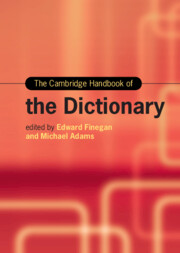Book contents
- The Cambridge Handbook of the Dictionary
- Cambridge Handbooks in Language and Linguistics
- The Cambridge Handbook of the Dictionary
- Copyright page
- Contents
- Figures
- Tables
- Contributors
- Acknowledgments
- Introduction
- Part I Types of Dictionaries
- Chapter 1 Dictionary Typologies
- Chapter 2 Historical and Other Specialized Dictionaries
- Chapter 3 Thesauri
- Chapter 4 Commercial Dictionaries
- Chapter 5 Bilingual Dictionaries
- Chapter 6 Learner’s Dictionaries
- Chapter 7 Children’s Dictionaries
- Chapter 8 Dictionaries of Quotations and Dictionaries of Proverbs
- Part II Dictionaries as Books
- Part III Dictionaries and Ideology
- Part IV Dictionaries and Domains of Use
- Part V The Business of Dictionaries
- Part VI The Future of Dictionaries
- References: Dictionaries
- References: Secondary Works
- Index
Chapter 1 - Dictionary Typologies
from Part I - Types of Dictionaries
Published online by Cambridge University Press: 19 October 2024
- The Cambridge Handbook of the Dictionary
- Cambridge Handbooks in Language and Linguistics
- The Cambridge Handbook of the Dictionary
- Copyright page
- Contents
- Figures
- Tables
- Contributors
- Acknowledgments
- Introduction
- Part I Types of Dictionaries
- Chapter 1 Dictionary Typologies
- Chapter 2 Historical and Other Specialized Dictionaries
- Chapter 3 Thesauri
- Chapter 4 Commercial Dictionaries
- Chapter 5 Bilingual Dictionaries
- Chapter 6 Learner’s Dictionaries
- Chapter 7 Children’s Dictionaries
- Chapter 8 Dictionaries of Quotations and Dictionaries of Proverbs
- Part II Dictionaries as Books
- Part III Dictionaries and Ideology
- Part IV Dictionaries and Domains of Use
- Part V The Business of Dictionaries
- Part VI The Future of Dictionaries
- References: Dictionaries
- References: Secondary Works
- Index
Summary
Beginning with the Romance philologist Yakov Malkiel, scholars have attempted to construct typologies adequate to the description of dictionaries in all their variety since the 1950s. Typologies are useful tools. They require that we abstract the distinctive features of various dictionary types by close examination and comparison of features, and they help us grasp the dictionary phenomenon by organizing it analytically. But typologies have limitations. For instance, on occasion, dictionaries cross types. Recent typologies tend to view the dictionary as a stable genre of language reference work, but people insist on making dictionaries for other reasons: some dictionaries enregister dialects and slang and other nonstandard language varieties, such that the dictionaries are more about maintaining social boundaries and promoting regional or social identities by means of enregisterment. Still others are facetious or in some other way devoted not to reference but to entertainment, not that the two are always mutually exclusive. Because dictionaries tend to confound attempts to typologize them, some scholars have tried to restrict the categories “dictionary” and “lexicography” to exclude the confounding texts and those who make them.
Keywords
- Type
- Chapter
- Information
- The Cambridge Handbook of the Dictionary , pp. 11 - 30Publisher: Cambridge University PressPrint publication year: 2024

